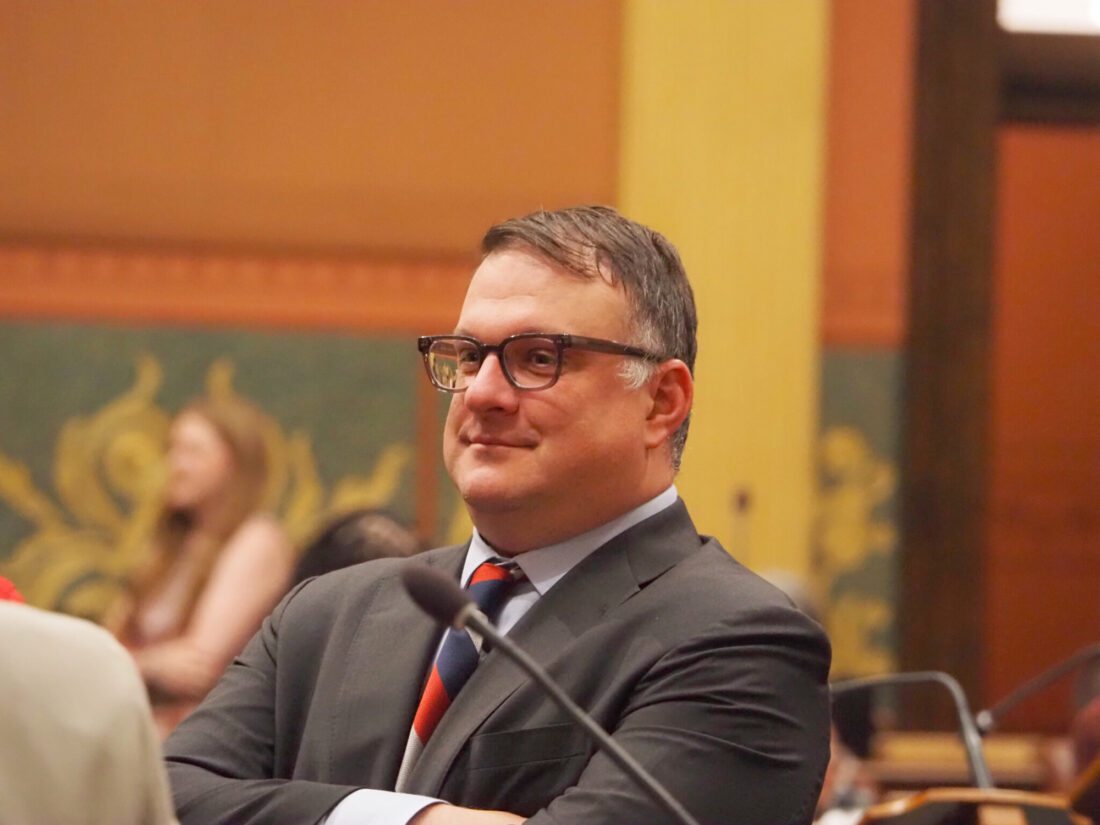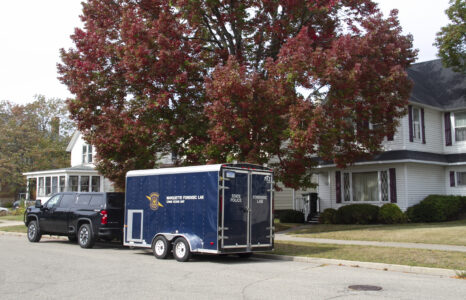Hall believes Senate will pass marijuana tax
- Michigan House Speaker Matt Hall, R-Richland Township, on the House floor Wednesday. (Ben Solis | Michigan Advance)
- The Michigan Capitol dome in Lansing. (Susan J. Demas, via Michigan Advance)

Michigan House Speaker Matt Hall, R-Richland Township, on the House floor Wednesday. (Ben Solis | Michigan Advance)
The leader of the Michigan House of Representatives said Thursday that he expects his Senate counterpart will deliver the votes needed to pass a proposed 24% wholesale tax on marijuana, and if not, he says the budget deal would fall apart at the seams.
Such a scenario would also lead to a full Michigan government shutdown, as House Speaker Matt Hall reiterated there will not be another continuation budget to keep the lights on if the deal brokered between him, Senate Majority Leader Winnie Brinks and Gov. Gretchen Whitmer falls apart.
“This was a revenue source that Winnie Brinks offered in private,” Hall said while speaking to reporters on Thursday. “We took them up on their suggestion of marijuana, and we all made a deal on the budget. Brinks would never make that deal if she can’t perform.”
It was now on the Senate to keep up their end of the road funding deal, Hall added.
A message seeking comment on the state of the marijuana tax from Brinks’ office was not returned at the time of publication

The Michigan Capitol dome in Lansing. (Susan J. Demas, via Michigan Advance)
The tax has opposition from some members of the House and Senate, although Hall has said throughout the week that the plan was put forward by Brinks. The tax outlined in House Bill 4951 was initiated in the lower chamber, however, sponsored by Rep. Samantha Steckloff, D-Farmington Hills.
That remains to be seen, given that at least one Democrat – Sen. Jeff Irwin of Ann Arbor – said that he would not vote for the measure as is.
Michigan cannabis industry stakeholders spent Tuesday in Lansing lobbying lawmakers and rallying in hopes that the Legislature would either walk away from its proposed tax to fund roads or amend the bill to rescue the tax but at a much more palatable rate.
On Tuesday, lawmakers worked late into the evening to move implementation bills that would set up passage of a final budget in the coming days. It was during that late-night session that an amendment to the proposed tax emerged in the Senate’s session database that would reduce the proposed tax to just 20%.
The amendment to House Bill 4951, put forward by state Sen. Stephanie Chang, D-Detroit, would also tie-bar the bill to Chang’s proposed tax on several tobacco products and levying a tax on e-cigarettes – Senate Bill 582.
If it were to gain traction, it could give some comfort to cannabis industry leaders who said the tax in its current proposed form would lead to a shrinking of the industry and job losses, but some opponents to the tax say that the number is still too high and wouldn’t get their votes.
Senate Bill 582 is in line with a bill she offered during the previous legislative session that levied an additional 75 mills on top of the tax levied on cigarettes, increasing the wholesale tax on cigars, noncigarette smoking tobacco, smokeless tobacco, and any tobacco product to 57% while levying a 57% wholesale tax on e-cigarettes.
In an interview with Michigan Advance, Chang said the amendment amounted to a concept of a plan, so to speak, and that she was just throwing it out there to see what the appetite was. She was not confident that it would be taken up, or pass even if it did.
Two House lawmakers said during an anti-marijuana tax rally Tuesday they were working behind the scenes to get that rate reduced. Chang was asked if she’s talked to her colleagues about the amendment, particularly on the House side, but she said she had not.
Irwin, who has been a strong critic of the House Republican’s proposed marijuana tax, said the reduction in the rate was an improvement, but not enough to bring him on board.
“I think it would still drive a lot of people out of the legal market, still discourage a lot of people from other states who are currently coming here because our prices are advantaged,” Irwin said. “And so if our prices are no longer attractive to customers in Michigan or from other states, we’re going to lose a lot of those customers.”
Now is not the time to be levying additional taxes on cannabis, Irwin argued, noting that a black market for the product still exists, and driving people toward that market will lead to a decrease in revenue. That was the sentiment shared by industry advocates at the rally on Tuesday.
Irwin also argued that lawmakers should respect the distribution model for cannabis taxes that voters approved when they voted to legalize the drug in 2018.
“If we’re going to change that, we certainly should have a three quarters majority to change it as demanded by the Michigan Constitution,” Irwin said.
Still, Hall thought that the deal on 24% would hold. He was adamant that he thought the initially proposed 32% tax on marijuana was too high, and that the House was able to bring that number down. Hall also wondered if the tax would change consumption habits, ultimately affecting the revenue the state could get from it. Chang would not discuss her reasoning behind the amendment other than that it was another option.
When asked if the House would concur with the amendment if it somehow passed, Hall was noncommittal and said again that they had a deal.
“If they try to change the terms of that deal, we would strip it out and we’d send it back the other way, because there are hundreds of things we could renegotiate in this deal, but then the government would shut down,” Hall said.
———
Michigan Advance reporter Kyle Davidson contributed to this story. Michigan Advance is part of States Newsroom, a national 501(c)(3) nonprofit. For more, go to https://michiganadvance.com.






